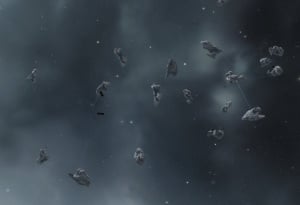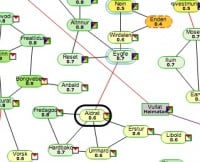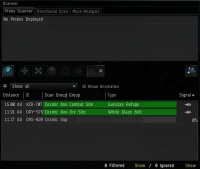
Ice Mining is the process of mining ice fields (commonly called "ice belts"). This mined ice can then refined and used to fuel capital ship jump drives, manufacture fuel for player-owned starbases (POS), and light cynosural fields. Ice mining can only be done with specialized modules (ice miners) which can only be fit to Mining Barges and Exhumers. Unlike ore mining, ice miners mine one block of ice (with a volume of 1000 m3) per cycle; as it's not possible to increase this yield, the only way to mine ice more efficiently is to decrease the ice miners' cycle times.
| A long, long time ago... |
|---|
| The Odyssey expansion (June 2013) changed ice mining considerably. Before the expansion, ice belts were permanent features in a system, with thousands of ice asteroids spread over hundreds of kilometers. This was changed to much smaller (10-20 ice asteroids each with 50-200 units of ice) dynamic belts which disappear once mined out, and then respawn four hours later. |
Advantages of Ice Mining
- Reduced attention required by the miner when compared with ore mining.
- Ability to be self-sufficient for POS fuel.
- Easier to mine without a dedicated hauler (longer cycle times mean fewer trips to the station).
- Fun factor of 4-hourly 'Ice Rush' when a belt spawns, as dozens of miners rush in to clear the belt.
Disadvantages of Ice Mining
- Reduced ISK yield compared to ore mining. While ice commands similar prices to ore, it's not possible to mine ice continuously due to the 4 hour respawn timer on ice belts.
Ice Belts


Ice belts can be found in every region of New Eden, but only in certain systems (a good place to see which systems is dotlan). Each of these systems contains one ice belt, which spawns after downtime, disappears once mined out, and then respawns four hours later. Unlike asteroid belts, ice belts are a type of Cosmic Anomaly, meaning they will appear in a different location in the star system every time they respawn, and can be found using your ship's onboard scanner (but do not require scan probes to find).
Ice Asteroids
As with ore asteroids, each ice asteroid contains one type of ice (so, for instance, an asteroid called "Blue Ice asteroid" will contain nothing but Blue Ice). There are twelve different types of ice asteroids, split into three categories: faction asteroids, enriched faction asteroids, and standard asteroids.
- The ice from faction asteroids (which contain Clear Icicle, Glacial Mass, Blue Ice, or White Glaze) refine to small quantities of Heavy Water, Liquid Ozone and Strontium Clathrates, but large amounts of their respective faction's isotope (Helium Isotopes, Hydrogen Isotopes, Oxygen Isotopes, and Nitrogen Isotopes). Each of these asteroid types is only found in the regions of space controlled by their respective faction (so, for instance, Blue Ice asteroids only spawns in Gallente space, and refine to (amongst others) Oxygen Isotopes, which are used to fuel the jump drives on Gallente ships and to manufacture fuel for Gallente POSes).
- The ice from enriched faction asteroids (which contain Enriched Clear Icicle, Smooth Glacial Mass, Thick Blue Ice, or Pristine White Glaze) works the same way as regular faction asteroids, but contain more of the same materials. These asteroids are only found in nullsec (in systems controlled by their respective factions).
- The ice from standard asteroids (which contain Glare Crust, Dark Glitter, Gelidus, and Krystallos) contains large quantities of Heavy Water, Liquid Ozone and Strontium Clathrates, but no faction isotopes. These asteroids are only found in low-sec and nullsec.
Assuming perfect refining skills (0% waste), ice asteroids refine to the following:
Like asteroid ore, unrefined ice takes up a large amount of space and can therefore be time-consuming to transport. The best sub-capital ship for transporting ice (and ore) is the Miasmos, a Gallente industrial which can transport up to 63,000 m3 (63 blocks, or about two loads from a Mackinaw) of ice. If you need to haul even larger quantities, it may be worth training to fly a freighter (which can hold over ten times as much), or to ship the ice by courier contract.
Ice Mining Mechanics
- Main article: Mining
Ice mining works in much the same way as ore mining: equip a ship with ice mining modules, approach and target an ice asteroid, and activate the mining module. At the end of each cycle, one unit of ice will be deposited in your ship's cargo or ore hold (despite its name, the ore hold can hold ice too). However (unlike ore mining) ice mining modules and only be fit on Mining Barges and Exhumers, and mining drones cannot be used.
Skills
- Main article: Mining skills
The core skill for ice mining is the (appropriately named) ![]() Ice Harvesting, which reduces the cycle time of ice mining modules by 5% per level. Train this to level V to use the Tech 2 ice miner.
Ice Harvesting, which reduces the cycle time of ice mining modules by 5% per level. Train this to level V to use the Tech 2 ice miner. ![]() Mining Upgrades is needed to install mining upgrade modules (which further decrease the cycle time of ice miners). Lastly, the
Mining Upgrades is needed to install mining upgrade modules (which further decrease the cycle time of ice miners). Lastly, the ![]() Mining Barge and/or
Mining Barge and/or ![]() Exhumers skills are needed to fly ice mining ships; training higher levels of these skills also decreases the cycle time of ice mining modules (depending on the bonuses of the ship being flown). Since most mining modules are fairly CPU-intensive (and fitting ice mining upgrades only makes this worse), you will probably need to train some fitting skills to take full advantage of your ice mining ship.
Exhumers skills are needed to fly ice mining ships; training higher levels of these skills also decreases the cycle time of ice mining modules (depending on the bonuses of the ship being flown). Since most mining modules are fairly CPU-intensive (and fitting ice mining upgrades only makes this worse), you will probably need to train some fitting skills to take full advantage of your ice mining ship.
Ice Mining ships
- Main article: Mining Ships
Mining Barges
Of the three mining barges, only the Covetor has a bonus to ice mining (3% reduction in cycle time per level of ![]() Mining Barge); at Mining Barge V it can mine about 15% more ice than its counterparts. However, its ore hold is fairly small (7000 m3), and will fill up in about ten minutes. The Procurer and the Retriever have the same ice mining yield, and each ship has a different strength (the Retriever has a very large ore hold, and the Procurer a very tough tank). As when using these ships for ore mining, the choice depends on your play style. Flying in a dangerous region of space? Use a Procurer. Want to mine for long stretches without returning to a station? Use a Retriever. Want to get the absolute maximum amount of ice you can? Use a Covetor.
Mining Barge); at Mining Barge V it can mine about 15% more ice than its counterparts. However, its ore hold is fairly small (7000 m3), and will fill up in about ten minutes. The Procurer and the Retriever have the same ice mining yield, and each ship has a different strength (the Retriever has a very large ore hold, and the Procurer a very tough tank). As when using these ships for ore mining, the choice depends on your play style. Flying in a dangerous region of space? Use a Procurer. Want to mine for long stretches without returning to a station? Use a Retriever. Want to get the absolute maximum amount of ice you can? Use a Covetor.
The other thing to note is that the Covetor, Retriever and Procurer can fit three, two, and one ice miners (respectively), but the Retriever and Procurer have an in-built bonus to cycle times (to arrive at similar overall yields, as above). Therefore, when mining with a Procurer you will have very short cycle times but can only mine one block of ice at a time, whereas a Covetor has much longer cycle times but can mine three blocks of ice at once.
Exhumers
Exhumers are straight upgrades from their Mining Barge counterparts, and the same reflections hold true for them. One small difference is that both the Skiff and the Mackinaw get a small (1%) reduction to ice harvester cycle time per level of ![]() Exhumers (the Hulk gets a 3% reduction per skill level, like its counterpart the Covetor).
Exhumers (the Hulk gets a 3% reduction per skill level, like its counterpart the Covetor).
Improving yield
- Main article: Mining Yield
In contrast with ore mining, all ice mining modules mine exactly one unit (1000 m3) of ice per cycle; therefore, the only way to increase your mining efficiency is to decrease your modules' cycle time. This can be done by training skills (see above), installing more advanced ice mining and mining upgrade modules, fitting Ice Harvester Accelerator rigs, flying more advanced ships (Exhumers instead of Mining Barges), or using implants (the IH-100x Inherent Implants 'Yeti' Ice Harvesting series). Additionally, if you are in a fleet, you can receive further bonuses through fleet boosts.
While each bonus may seem small, when taken together they can make a significant difference:
As mining ice often turns into a race, with large number of miners competing to mine as much ice before the belt is emptied, having short cycle times can be an advantage beyond simply mining more ice in a given period of time. This allows you to beat your competition to those last few pieces of ice in a belt (as, if two miners are attempting to mine the same asteroid with only one unit of ice left, whoever finishes their cycle first gets that block of ice, and the other gets nothings). Using a survey scanner can be very helpful, as you can see how much ice is left in each asteroid.
See also
| |||||||||||
